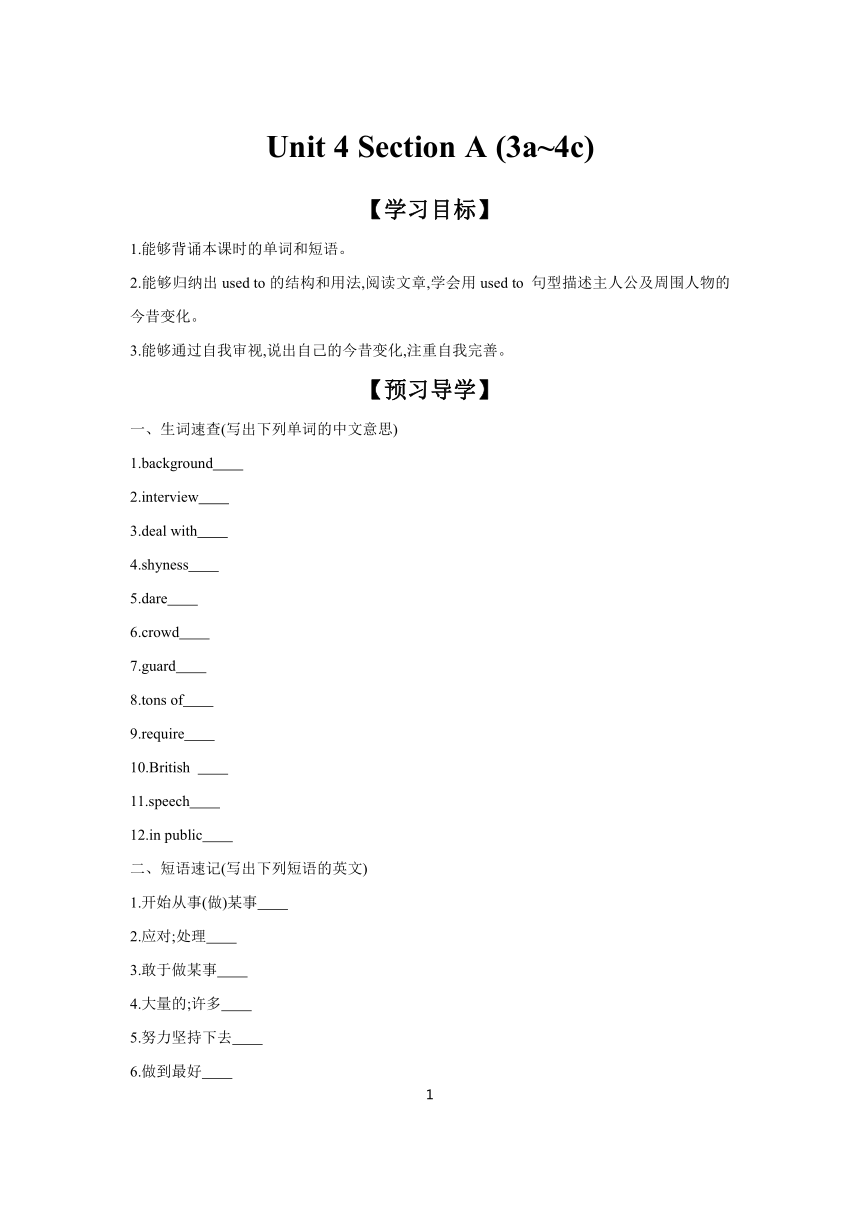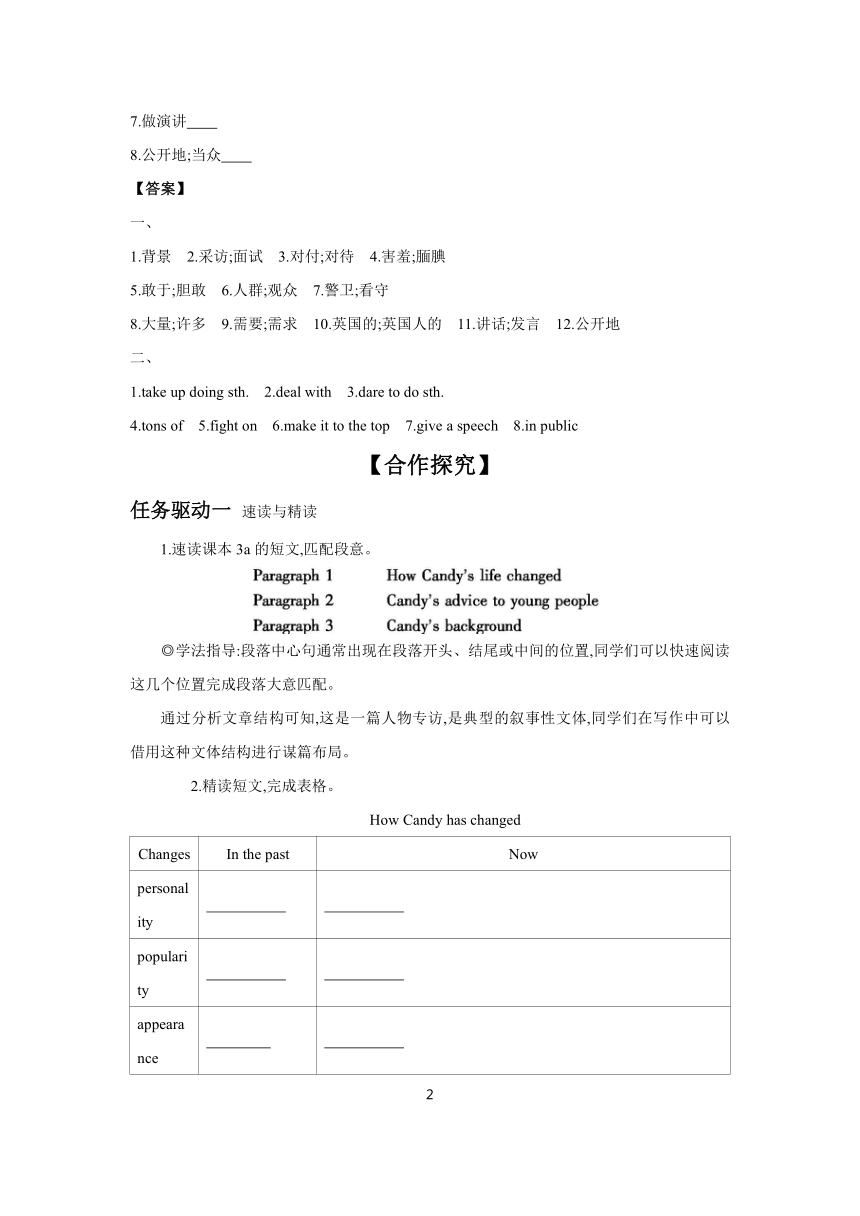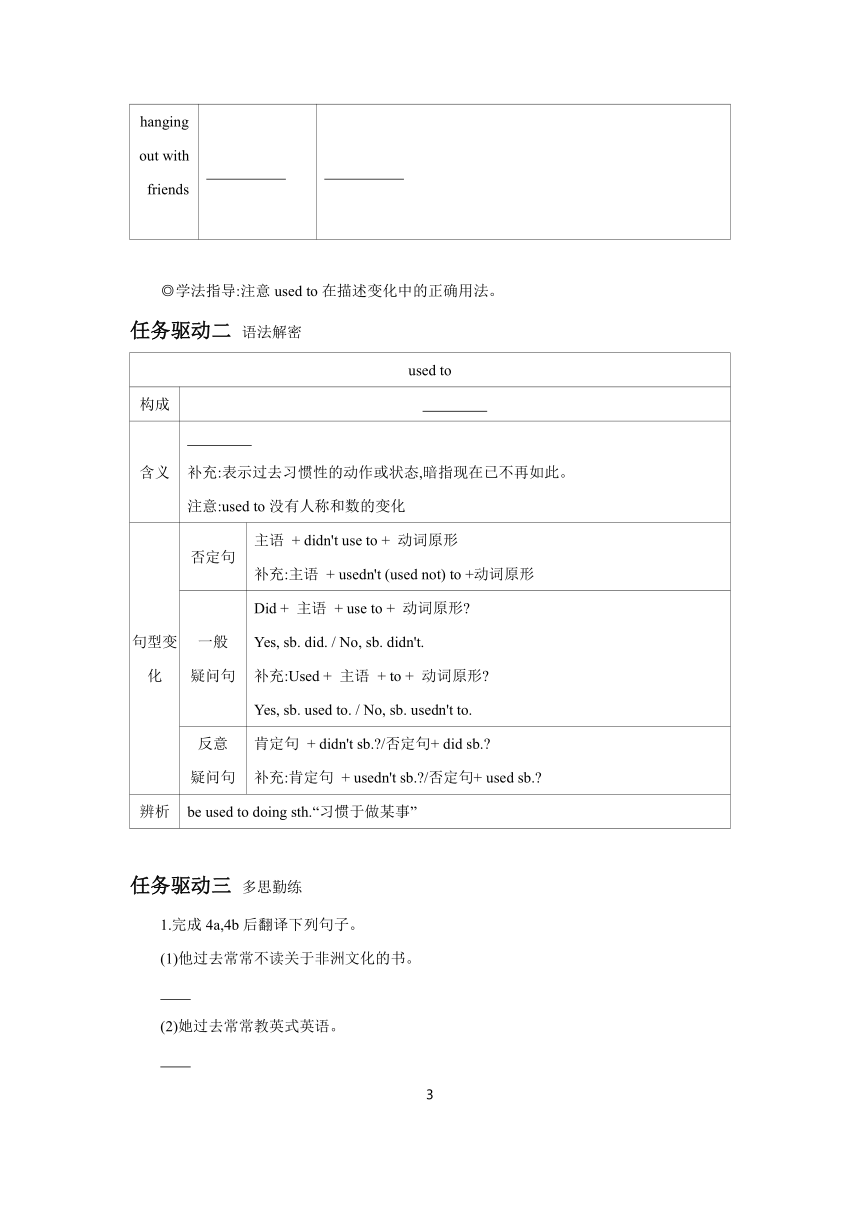Unit 4 I used to be afraid of the dark Section A (3a~4c) 学案
文档属性
| 名称 | Unit 4 I used to be afraid of the dark Section A (3a~4c) 学案 |

|
|
| 格式 | docx | ||
| 文件大小 | 65.3KB | ||
| 资源类型 | 教案 | ||
| 版本资源 | 人教新目标(Go for it)版 | ||
| 科目 | 英语 | ||
| 更新时间 | 2024-02-21 16:31:17 | ||
图片预览



文档简介
Unit 4 Section A (3a~4c)
【学习目标】
1.能够背诵本课时的单词和短语。
2.能够归纳出used to的结构和用法,阅读文章,学会用used to 句型描述主人公及周围人物的今昔变化。
3.能够通过自我审视,说出自己的今昔变化,注重自我完善。
【预习导学】
一、生词速查(写出下列单词的中文意思)
1.background
2.interview
3.deal with
4.shyness
5.dare
6.crowd
7.guard
8.tons of
9.require
10.British
11.speech
12.in public
二、短语速记(写出下列短语的英文)
1.开始从事(做)某事
2.应对;处理
3.敢于做某事
4.大量的;许多
5.努力坚持下去
6.做到最好
7.做演讲
8.公开地;当众
【答案】
一、
1.背景 2.采访;面试 3.对付;对待 4.害羞;腼腆
5.敢于;胆敢 6.人群;观众 7.警卫;看守
8.大量;许多 9.需要;需求 10.英国的;英国人的 11.讲话;发言 12.公开地
二、
1.take up doing sth. 2.deal with 3.dare to do sth.
4.tons of 5.fight on 6.make it to the top 7.give a speech 8.in public
【合作探究】
任务驱动一 速读与精读
1.速读课本3a的短文,匹配段意。
◎学法指导:段落中心句通常出现在段落开头、结尾或中间的位置,同学们可以快速阅读这几个位置完成段落大意匹配。
通过分析文章结构可知,这是一篇人物专访,是典型的叙事性文体,同学们在写作中可以借用这种文体结构进行谋篇布局。
2.精读短文,完成表格。
How Candy has changed
Changes In the past Now
personality
popularity
appearance
hanging out with friends
◎学法指导:注意used to在描述变化中的正确用法。
任务驱动二 语法解密
used to
构成
含义 补充:表示过去习惯性的动作或状态,暗指现在已不再如此。 注意:used to没有人称和数的变化
句型变化 否定句 主语 + didn't use to + 动词原形 补充:主语 + usedn't (used not) to +动词原形
一般 疑问句 Did + 主语 + use to + 动词原形 Yes, sb. did. / No, sb. didn't. 补充:Used + 主语 + to + 动词原形 Yes, sb. used to. / No, sb. usedn't to.
反意 疑问句 肯定句 + didn't sb. /否定句+ did sb. 补充:肯定句 + usedn't sb. /否定句+ used sb.
辨析 be used to doing sth.“习惯于做某事”
任务驱动三 多思勤练
1.完成4a,4b后翻译下列句子。
(1)他过去常常不读关于非洲文化的书。
(2)她过去常常教英式英语。
(3)Emily过去常常听流行音乐,但是现在她喜欢乡村音乐。
(4)Emily过去常常不读许多书,但现在她每年至少读6本。
2.自我审视,完善自我。
My changes
Changes In the past Now
the dark I used to be afraid of the dark. I'm not afraid anymore.
giving a speech in public I used to hate giving a speech in public. I can make it now.
... ... ...
... ... ...
【答案】
任务驱动一
1.
2.She used to be shy. She's not shy anymore. She didn't use to be popular. She gets tons of attention.
She didn't use to worry about how she appears to others. She worries about it. She used to hang out with friends. It's almost impossible.
任务驱动二
used to + 动词原形 “过去常常做某事”
任务驱动三
1.1)He didn't use to read books on African culture. / He usedn't to read books on African culture.2)She used to teach British English.3)Emily used to listen to pop music, but now she enjoys country music.
4)Emily didn't use to read a lot of books, but now she reads at least six books a year./Emily usedn't to read a lot of books, but now she reads at least six books a year.
【知识超市】
[命题点一]
Candy told me that she used to be really shy and took up singing to deal with her shyness. Candy告诉我她过去真的很害羞,于是她开始唱歌来克服腼腆。
◎观察思考:
1.My grandfather took up learning English at the age of sixty. 我爷爷六十岁开始学英语。
2.He is going to take up a hobby like painting. 他打算培养一个爱好,如绘画。
3.My mom has taken up playing the piano since she retired. 我妈妈自从退休后就开始学弹钢琴。
◎用法总结: take up 意为“开始做;开始从事”,通常指开始某项工作、某个爱好等,尤其指做以前从未做过的事情或作为消遣的事。take up doing sth. 意为“开始做某事”。此外take up还可意为“占据(某空间或时间);继续;接下去”等。
对点自测
根据汉语意思完成句子
1.我打算开始学做饭,因为我喜欢吃美食。
I'm going to take up (cook) because I like eating delicious food.
2.电脑游戏占据了他太多的时间。
Computer games too much of his time.
[命题点二]
Only a very small number of people make it to the top. 仅仅很少数的人成功到达辉煌的顶峰。
◎观察思考:
1.A number of students are planting trees on the hill. 许多学生正在山上植树。
2.A number of apples are red. 许多苹果是红色的。
3.There are a number of books in the library. 图书馆里有很多书。
◎用法总结:a number of 意为“许多;若干”,后接可数名词复数,谓语动词用复数。而the number of 意为 “……的数量”,后接可数名词复数,谓语动词用单数。
对点自测
根据汉语意思完成句子
1.只有少数的学生能上北京大学和清华大学。
Only a students can be accepted by Peking University and Tsinghua University.
2.这所医院女医生的数量超过100人。
women doctors in this hospital is over one hundred.
【答案】
命题点一
对点自测
1.cooking 2.take up
命题点二
对点自测
1.small number of 2.The number of
2
【学习目标】
1.能够背诵本课时的单词和短语。
2.能够归纳出used to的结构和用法,阅读文章,学会用used to 句型描述主人公及周围人物的今昔变化。
3.能够通过自我审视,说出自己的今昔变化,注重自我完善。
【预习导学】
一、生词速查(写出下列单词的中文意思)
1.background
2.interview
3.deal with
4.shyness
5.dare
6.crowd
7.guard
8.tons of
9.require
10.British
11.speech
12.in public
二、短语速记(写出下列短语的英文)
1.开始从事(做)某事
2.应对;处理
3.敢于做某事
4.大量的;许多
5.努力坚持下去
6.做到最好
7.做演讲
8.公开地;当众
【答案】
一、
1.背景 2.采访;面试 3.对付;对待 4.害羞;腼腆
5.敢于;胆敢 6.人群;观众 7.警卫;看守
8.大量;许多 9.需要;需求 10.英国的;英国人的 11.讲话;发言 12.公开地
二、
1.take up doing sth. 2.deal with 3.dare to do sth.
4.tons of 5.fight on 6.make it to the top 7.give a speech 8.in public
【合作探究】
任务驱动一 速读与精读
1.速读课本3a的短文,匹配段意。
◎学法指导:段落中心句通常出现在段落开头、结尾或中间的位置,同学们可以快速阅读这几个位置完成段落大意匹配。
通过分析文章结构可知,这是一篇人物专访,是典型的叙事性文体,同学们在写作中可以借用这种文体结构进行谋篇布局。
2.精读短文,完成表格。
How Candy has changed
Changes In the past Now
personality
popularity
appearance
hanging out with friends
◎学法指导:注意used to在描述变化中的正确用法。
任务驱动二 语法解密
used to
构成
含义 补充:表示过去习惯性的动作或状态,暗指现在已不再如此。 注意:used to没有人称和数的变化
句型变化 否定句 主语 + didn't use to + 动词原形 补充:主语 + usedn't (used not) to +动词原形
一般 疑问句 Did + 主语 + use to + 动词原形 Yes, sb. did. / No, sb. didn't. 补充:Used + 主语 + to + 动词原形 Yes, sb. used to. / No, sb. usedn't to.
反意 疑问句 肯定句 + didn't sb. /否定句+ did sb. 补充:肯定句 + usedn't sb. /否定句+ used sb.
辨析 be used to doing sth.“习惯于做某事”
任务驱动三 多思勤练
1.完成4a,4b后翻译下列句子。
(1)他过去常常不读关于非洲文化的书。
(2)她过去常常教英式英语。
(3)Emily过去常常听流行音乐,但是现在她喜欢乡村音乐。
(4)Emily过去常常不读许多书,但现在她每年至少读6本。
2.自我审视,完善自我。
My changes
Changes In the past Now
the dark I used to be afraid of the dark. I'm not afraid anymore.
giving a speech in public I used to hate giving a speech in public. I can make it now.
... ... ...
... ... ...
【答案】
任务驱动一
1.
2.She used to be shy. She's not shy anymore. She didn't use to be popular. She gets tons of attention.
She didn't use to worry about how she appears to others. She worries about it. She used to hang out with friends. It's almost impossible.
任务驱动二
used to + 动词原形 “过去常常做某事”
任务驱动三
1.1)He didn't use to read books on African culture. / He usedn't to read books on African culture.2)She used to teach British English.3)Emily used to listen to pop music, but now she enjoys country music.
4)Emily didn't use to read a lot of books, but now she reads at least six books a year./Emily usedn't to read a lot of books, but now she reads at least six books a year.
【知识超市】
[命题点一]
Candy told me that she used to be really shy and took up singing to deal with her shyness. Candy告诉我她过去真的很害羞,于是她开始唱歌来克服腼腆。
◎观察思考:
1.My grandfather took up learning English at the age of sixty. 我爷爷六十岁开始学英语。
2.He is going to take up a hobby like painting. 他打算培养一个爱好,如绘画。
3.My mom has taken up playing the piano since she retired. 我妈妈自从退休后就开始学弹钢琴。
◎用法总结: take up 意为“开始做;开始从事”,通常指开始某项工作、某个爱好等,尤其指做以前从未做过的事情或作为消遣的事。take up doing sth. 意为“开始做某事”。此外take up还可意为“占据(某空间或时间);继续;接下去”等。
对点自测
根据汉语意思完成句子
1.我打算开始学做饭,因为我喜欢吃美食。
I'm going to take up (cook) because I like eating delicious food.
2.电脑游戏占据了他太多的时间。
Computer games too much of his time.
[命题点二]
Only a very small number of people make it to the top. 仅仅很少数的人成功到达辉煌的顶峰。
◎观察思考:
1.A number of students are planting trees on the hill. 许多学生正在山上植树。
2.A number of apples are red. 许多苹果是红色的。
3.There are a number of books in the library. 图书馆里有很多书。
◎用法总结:a number of 意为“许多;若干”,后接可数名词复数,谓语动词用复数。而the number of 意为 “……的数量”,后接可数名词复数,谓语动词用单数。
对点自测
根据汉语意思完成句子
1.只有少数的学生能上北京大学和清华大学。
Only a students can be accepted by Peking University and Tsinghua University.
2.这所医院女医生的数量超过100人。
women doctors in this hospital is over one hundred.
【答案】
命题点一
对点自测
1.cooking 2.take up
命题点二
对点自测
1.small number of 2.The number of
2
同课章节目录
- Unit 1 How can we become good learners.
- Section A
- Section B
- Unit 2 I think that mooncakes are delicious!
- Section A
- Section B
- Unit 3 Could you please tell me where the restroom
- Section A
- Section B
- Unit 4 I used to be afraid of the dark.
- Section A
- Section B
- Unit 5 What are the shirts made of?
- Section A
- Section B
- Review of Units 1-5
- Unit 6 When was it invented?
- Section A
- Section B
- Unit 7 Teenagers should be allowed to choose their
- Section A
- Section B
- Unit 8 It must belong to Carla.
- Section A
- Section B
- Unit 9 I like music that I can dance to.
- Section A
- Section B
- Unit 10 You're supposed to shake hands.
- Section A
- Section B
- Review of Units 6-10
- Unit 11 Sad movies make me cry.
- Section A
- Section B
- Unit 12 Life is full of the unexpected
- Section A
- Section B
- Unit 13 We're trying to save the earth!
- Section A
- Section B
- Unit 14 I remember meeting all of you in Grade 7.
- Section A
- Section B
- Review of Units 11-14
